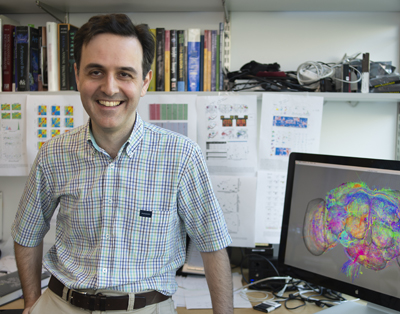Submitted by Administrator on Wed, 18/07/2018 - 10:50
 Many congratulations to Dr Greg Jefferis who has been awarded the Royal Society's Francis Crick Medal and Lecture 2019 for his discoveries concerning the developmental and functional logic of sensory information processing.
Many congratulations to Dr Greg Jefferis who has been awarded the Royal Society's Francis Crick Medal and Lecture 2019 for his discoveries concerning the developmental and functional logic of sensory information processing.
Greg has a long association with the University of Cambridge and with the Department of Zoology. He started as an undergraduate Natural Sciences student, graduating in 1998 before joining Stanford University to study for his PhD in Neurosciences with Liqun Luo. In 2004 he returned to Cambridge as a research fellow in the Department. He then joined the Neurobiology Division of the Medical Research Council Laboratory of Molecular Biology (LMB), receiving tenure in 2014. Greg also directs the Wellcome Trust funded Connectomics Group based in the Department.
Greg’s research focuses on the neural circuit basis of behaviour, using the fruit fly, Drosophila, as a model. Drosophila, has a miniature brain the size of a poppy seed containing about 100 thousand neurons, but is still capable of surprisingly sophisticated behaviour. During his time as research fellow in Zoology, Greg developed brain mapping techniques with single neuron resolution and used them to show that odour representations of different biological significance are spatially segregated in higher brain areas. After starting a group at the LMB, Greg and his collaborators were the first to identify widespread sex differences in the neuroanatomy of the fly brain; they were also the first to uncover a sex-specific switch in connectivity and information flow in an animal brain. Most recently they have identified how learned and innate sensory representations are combined and how this interaction is critical to memory recall. This work leveraged the efforts of the Connectomics Group who are mapping connections between individual nerve cells across the fly brain.
Greg’s group is trying to understand basic principles of how innate and learned behaviours emerge from brain networks in a relatively simple organism. However it is very likely that these principles are shared across evolution, so this work should eventually help us to understand the function of bigger brains in health and disease.
Upon receiving the award Greg said: I’m extremely happy that my area of research – genetic approaches to neural circuits – is being recognised. I’d also like to emphasise that while it’s lovely to receive a personal award, neuroscience is a wide-ranging and highly collaborative field: at the last count I have 131 co-authors all of whom made a significant contribution to the body of work being recognised.
Dr Gregory Jefferis' LMB profile
Dr Gregory Jefferis' Zoology profile
